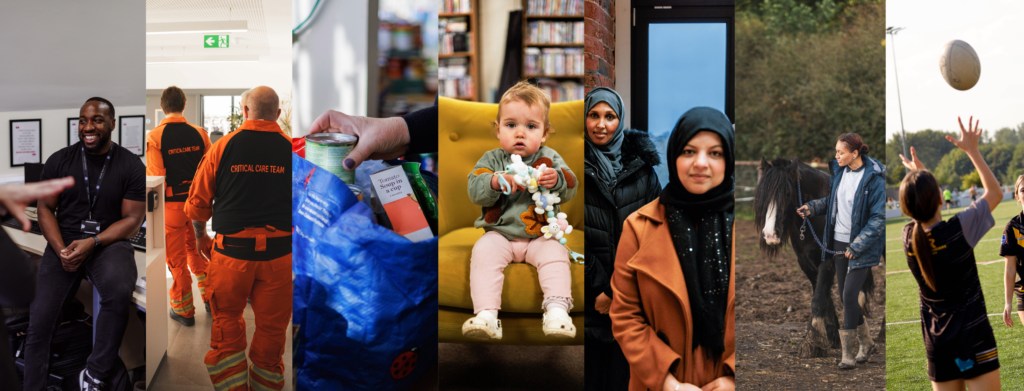
A founder’s perspective: Dreaming bigger with loan finance
As Europe’s largest urban sports centre, Adrenaline Alley attracts skaters from across the world. The charity bought their six-acre site with the help of a £900,000 loan from Charity Bank.
As founder and director Mandy Young MBE DL explains, the loan has helped the charity to become more sustainable, save money and attract other funding.
Why did you decide to buy the site rather than continue renting?
Our landlord had given us the use of three buildings for 10 years but had decided it was time to sell the land. So we either needed to buy it or move elsewhere and start paying a lot of rent. History has proven that skate parks with large overheads just aren’t sustainable. Plus, by purchasing the land we would gain assets for the future.
Have you saved money by buying rather than renting?
Yes definitely. And at the end of the day, the park will belong to the charity when we’ve paid off the loan. If we were renting the site that would never happen.
Have you been able to develop the charity quicker as a result of the loan?
Yes. It helps that we’ve been able to attract more funding now that we hold assets. For a start, we got match funding through Power to Change, so we were able to refurbish the site, add new areas and improve the café. We have just secured a further £392k and the funding criteria to get that funding was that we owned the land. We now have the confidence to apply for bigger and better grants and projects.
Has the loan helped to strengthen your organisation in other ways?
One of the biggest plus points is the security that ownership gives us; the land can’t just be whipped away from us. We can now dream bigger! Our Board is very proactive, and owning the park means we can now look at longer-term plans and strategies.
We’ve been able to make things better for our customers. The refurbished café is a much nicer space to be in and has proven very popular with parents. It now brings in just under a third of our income.
All the improvements have lifted us to world class level and we now get around 10% more visitors.
Had you taken a large loan out before?
We had thought about taking out a loan earlier on, and I’d spoken to Charity Bank, but we were too frightened to do it back then. It seemed like so much money. I think that was the right decision; we weren’t ready at that stage and it didn’t make financial sense.
But we grew and I decided it was the right time to make that commitment.
Why did you choose Charity Bank for your loan?
Being a charity ourselves, it was important for us to use an ethical lender. We did look at high-street lenders though, but they had higher rates and everything was more complicated. It was an easier process with Charity Bank and we were able to build a relationship with them before we even applied.
How did you weigh up the risks and benefits of loan finance?
The biggest risk was that we could have lost the charity without the loan. The financial business plan stacked up, and the payments were affordable, so there just wasn’t a case not to do it. The only thing holding us back was fear – £900,000 is a phenomenal amount. But we knew we were going to get a lot for that money. Sometimes you’ve got to take a chance.
How did Charity Bank help to ease your concerns?
Our relationship manager, Peter Hughes, is really good and came out to present to the Board. He talked through the processes and procedures, allayed our concerns and gave me confidence that we could afford the repayments and that our business plan stacked up.
We send Charity Bank our monthly accounts now, and I know that if anything goes wrong, I can contact Peter.
How did you find the process of taking out a loan?
Relatively easy. We had legal people involved, which took some of the workload off. If I didn’t understand something, I could just call up. We’re lucky in that we have a highly experienced Board, and we’re used to cumbersome grant applications!
What would you say to other charities who are thinking about moving from renting to ownership?
First, make sure your business plan is in order and your numbers stack up. You don’t want to be worried about whether you can make the loan payments. You also need to have confidence in your organisation. As long as you’ve weighed up the risks and you’re comfortable with taking out a loan, then you need to take the chance if not doing so could mean you’d lose the charity or pay out a lot of money on rent rather than reinvesting it in your organisation.
What are you most proud of when you speak to your service users, and reflect on how far Adrenaline Alley has come?
We’re continuing to grow when a lot of indoor skate parks are struggling. We’ve become a destination rather than just a local park. We’re welcoming in skilled riders from other countries – that astounds me. We keep moving forward, doing new things, planning new developments, changing areas so that every time those riders come back the park is different and so they’re motivated to return.
What does the future hold for Adrenaline Alley?
We have just completed a unique Olympic-friendly European training centre. We’re also redeveloping part of the park, installing new infrastructure such as facial recognition in reception and looking at creating a space for wheelchair motocross. WCMX (wheelchair skating) isn’t an official sport at the moment, so we want to bring it under the umbrella of Adrenaline Alley, help to develop it and lobby for it to be included in the Paralympics.
Find out more about Adrenaline Alley in our case study.
About Charity Bank
Charity Bank is the loans and savings bank owned by and committed to supporting the social sector. Since 2002, we have used our savers’ money to make more than 1280 loans totalling over £500m to housing, education, social care, community and other social purpose organisations.
Nothing in this article constitutes an invitation to engage in investment activity nor is it advice or a recommendation and professional advice should be taken before any course of action is pursued.


